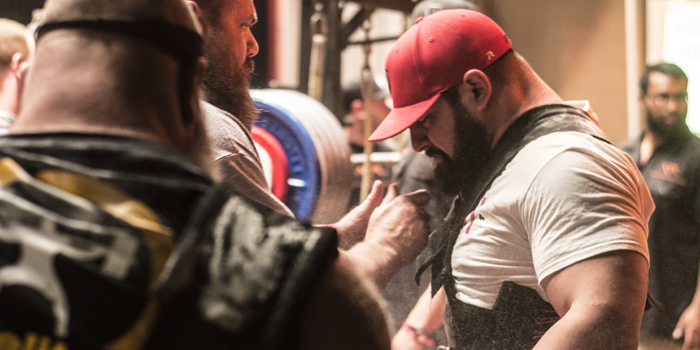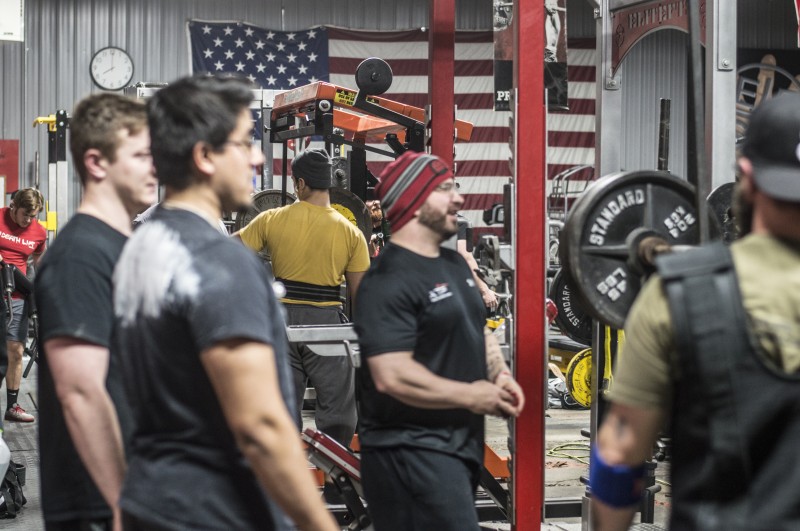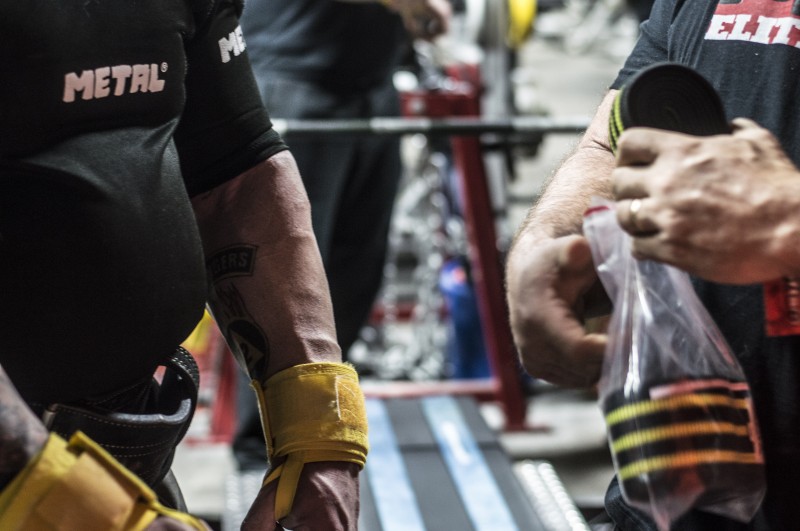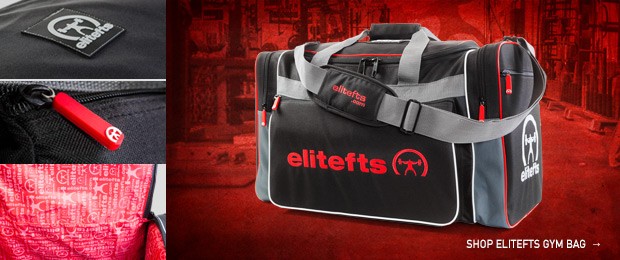
I played various types and levels of sports from 1985-2009. Through that time, I have observed and learned from a variety of coaching philosophies. Some were effective and some not so much. Each coached the way they believed would attain the best results.
The key to building and maintaining a successful team is that every member must buy-in to the concepts and beliefs of the coaches, otherwise the team cannot thrive. I am trying to incorporate certain effective concepts to the powerlifting at Tank's Training Facility (TTF).
TTF has all of the physical things a powerlifter needs in order to become successful: platforms, monolifts, glute/ham raises, reverse-hypers, pendulum leg curls, crap-load of bars and specialty bars, turf area for sled work, dumbbells up to 150 pounds, belt squat machines, chains, bands, and a whole lot more. We also have a great environment in which to "get down."
We have three knowledgeable, experienced, and devoted coaches at TTF who provide free training. In addition to myself, there is Randy Presswood and Ed Clark. We all put our lifters in the best position to win and set PR's. Unlike most coaches, we charge $0.00 for helping and programming. We all do this because we love the strength sport. All you need to do is join the gym!
Back on the topic of running powerlifting like a sport. Any successful team needs all of its athletes to be on the same page and shooting for the same goal: A CHAMPIONSHIP. In powerlifting, I would say a championship is a result of setting a PR meet after each meet and, within time, breaking into the all-time top 20 records while getting to the number one spot.
RECENT: How To Get Your Athletes to Buy In
Similar to any sport team that I have played for, when there is a problem brewing with an athlete, you need to address it as soon as possible. If the problem cannot be resolved or if your gut tells you this isn't the direction you want to go with the team, you have to let that problem athlete go. This could be compared to getting kicked off a team or traded (something I have witnessed many times).
It is difficult to do, but I have had to let go of a few of my (now ex) favorite lifters due to difference of opinion. Any team will work better without distractions. You have heard the phrase, "That athlete is a cancer to the team." This just means that the problem athlete (the cancer) will take away from the team concept and the ultimate goal (that championship/PRs) across the board.
Back to training and coaching: I would label the way I train powerlifters as a hybrid of what Westside Barbell does (a hybrid of the conjugate system). Over my 25 years of lifting, I have lifted on my own at 13 years old, lifted with a group of ‘old school’ powerlifters when I was 16 years old, and have lifted and been trained by some of the best, well-known strength and conditioning coaches in the country from age 18 to 33 years old. I took up the sport of powerlifting five years ago learning by trial and error and incorporating the systems that I knew were proven to work.
The program I run with our powerlifters has never produced an athlete who has not set a PR at their next powerlifting meet. This 'should' have all our athletes and others excited about following a program with our team. However, when claims are made on social media, we see our lifters (and others in the area) getting confused and/or excited while trying to follow those popular (or liked) powerlifters on social media. This causes issues as most of these "liked" social media ‘superstars’ (can't believe I just said that) are merely genetically gifted or so over-chemically enhanced that hardly anyone could catch them.
A great phrase to explain this is, "too many cooks in the kitchen." This would mean an athlete would have trouble following the program they are currently working on because every video they watch with their powerlifting superstar might be doing something way different than the program they are doing currently. It confuses them and displeases them.
I have had some powerlifters in the past who have (at every meet) improved/set a PR but were still unhappy with what we were doing. Sounds crazy, right?
Now Back to TTF. We currently have over 20 lifters from around the area coming in daily, busting their asses, and getting better. Recently our lifters doing the XPC powerlifting championships did theirheaviest squats of the training cycle. We had so many lifters come out to help that weren't even lifting that time. This is what I am looking for!
RELATED: Third Time’s a Charm or Three Strikes You're Out?
Now, mind you I am still recovering from three open heart surgeries and haven't been the best at being able to physically help. But week by week, I am getting more involved. My ultimate goal for the team at TFF is for it to grow much larger and be setup like a professional team. I would like to eventually have the lifters on a one-year contract with set obligations. They in return would get comped out gym memberships, free programming, free supplements, paid meet fees, and a few other perks. This in itself would attract many area lifters. We offer some of these concepts already. About half of our current lifters travel 30 minutes to an hour just to train with us. As with anything, if you have a good product they will come. The majority of my new clients are coming from out of town.
The concept of this team I am trying to build is completely different from just being a sponsored athlete. A sponsored athlete is just that: sponsored, and helping to represent that company to their best abilities. Live, Learn, Pass On is one of the best examples of a true training facility that I have ever heard of.
Dave at elitefts has by far done the best with this sponsorship for nearly 20 years. I see it as an honor that he picked me up and sponsored me. Since I started following elitefts.com in 2000 I have continually learned from some of the best lifters and coaches around who contribute on his website.
Now, let's briefly touch on being on a team when you live states away. I see a lot of talk about team so-and-so, when that particular lifter never really lifts with that team in that team gym or facility. Does it makes lifters feel cooler or better to be on Team Douchebag? To be honest, I think this is particularly funny. It goes back to searching the social media for your sense of worth. Mind you this is not the same as a sponsored athlete.
Getting back to being on an actual team: Unlike most high level sports where you have to be one of the best, on our powerlifting team we welcome anyone who is willing to do the following:
- Listen
- Bust your ass every training session
- Be coachable
These three things sound simple and easy to follow, but that is not always the case. As a lifter progresses, a few become head-jobs (this is not the good head-job I am speaking of). Good head-jobs usually begin in your parent’s car while in high school behind the local Seven Eleven. Bad head-jobs usually take form of a lifter who is stuck in the social media or "too many cooks in the kitchen" topics we covered earlier. A lifter who is constantly wondering, “Why aren’t we doing this or that?” would be considered a bad head-job.
To conclude and to reiterate: I coach and help my team as a hobby because I enjoy and believe in it. Doing this is by no means a way to make ends meet. In fact, the money I make from this could barely fill my gas tank. Most won't understand this. Maybe it's because I am wired differently than others or maybe it's because I want to pass on what I have learned throughout the past 25 years so others can be even better than me.
Results for followers on what I set for them:
- Kyle Stewart hit a 70-pound meet PR at the Arnold Classic. Kyle is one of our most gifted lifters. He came to us at TTF and had a great base but needed some help on his program. He was following another template for a while and was stuck.
- Kristin Wykoff hit a 105-pound meet PR at the Arnold Classic. She is an ex D1 thrower and hasn't bench pressed or deadlifted almost ever. Her 1100-pound total isn't even close to what she will get at next meet. Look for a big PR from her.
- Jim Dunn to me had the most difficult out of the three, setting a meet PR of 30 pounds. I say this as he was working out of town for the few weeks leading up to the Arnold, therefore it was hard to train with anyone and in a commercial gym.
- Andrew Tucker (at our in-house SPF meet) set a 50-pound meet PR and missed a couple of his lifts. He is also coming to us off a big back injury so this was a great accomplishment.
- Cody Siverly set a 95-pound meet PR while only hitting a token squat, which is nuts. He has a bright future once he gets his knee right.
As I have said, if your program and coaching decreases your meet PR then after a meet or two you should try someone or something else. However, no lifter I have coached has gone downhill — only uphill! We have a great base and team feel at the facility. Everyone is working with each other and helping each other. Look for big things from TTF as we grow in the next few years.













2 Comments